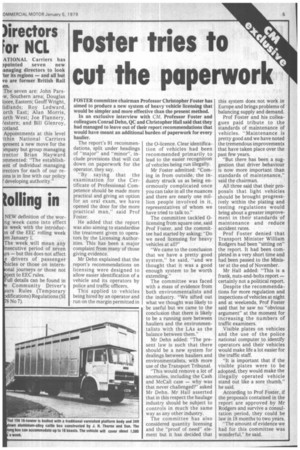Foster tries to cut the paperwork
Page 7

If you've noticed an error in this article please click here to report it so we can fix it.
FOSTER committee chairman Professor Christopher Foster has aimed to produce a new system of heavy vehicle licensing that would be simpler and more effective than the present method.
In an exclusive interview with CM, Professor Foster and colleagues Conrad Dehn, QC and Christopher Hall said that they had managed to leave out of their report recommendations that would have meant an additional burden of paperwork for every haulier.
The report's 91 recommendations, split under headings of "major" and "minor", include provisions that will cut down on paperwork for the operator, they say.
"By saying that the examination for the Certificate of Professional Competence should be made more practical and giving an option for an oral exam, we have opened the door for the more practical man," said Prof Foster.
He added that the report was also aiming to standardise the treatment given to operators by the Licensing Authorities. This has been a major complaint from many of those giving evidence.
Mr Dehn explained that the report's recommendations on licensing were designed to allow easier identification of a vehicle and its operators by police and traffic officers.
This applied to vehicles being hired by an operator and run on the margin permitted in the 0-licence. Clear identification of vehicles had been recommended primarily. to lead to the easier recognition of vehicles being run illegally.
Mr Foster admitted: "Coming in from outside, the industry struck us as being enormously complicated once you can take in all the nuances and there are nearly one million people involved in it, representatives of whom we have tried to talk to."
The committee tackled 0licensing from square one, said Prof Foster, and the committee had started by asking: "Do we need licensing for heavy vehicles at all?"
-We came to the conclusion that we have a pretty good system," he said, "and we thought that it was a good enough system to be worth extending."
The committee was faced with a mass of evidence from both environmentalists and the industry. "We sifted out what we thought was likely to be useful but we came to the conclusion that there is likely to be a running sore between hauliers and the environmentalists with the LAs as the balance between them."
Mr Dehn added: "The present law is such that there should be a new system for dealings between hauliers and environmentalists, with more use of the Transport Tribunal.
"This would remove a lot of anomalies, including the Cash and McCall case — why was that never challenged?" asked Mr Dehn. Mr Hall asserted that in this respect the haulage industry should be subject to controls in much the same way as any other industry.
The committee has also considered quantity licensing and the "proof of need" element but it has decided that this system does not work in Europe and brings problems of balancing supply and demand.
Prof Foster and his colleagues paid tribute to the standards of maintenance of vehicles. "Maintenance is pretty good and we have noted the tremendous improvements that have taken place over the past few years.
"But there has been a suggestion that driver behaviour is now more important than standards of maintenance," said the chairman.
All three said that their proposals that light vehicles should be brought progressively within the plating and testing regulations would bring about a greater improvement in their standards of maintenance and reduce accident rates.
Prof Foster denied that Transport Minister William Rodgers had been "sitting on" the report. It had been completed in a very short time and had been passed to the Minister at the end of November.
Mr Hall added: "This is a frank, nuts-and-bolts report — certainly not a political report.
Despite the recommendations for more regulation and inspections of vehicles at night and at weekends, Prof Foster said that he saw no "obvious argument" at the moment for increasing the numbers of traffic examiners.
Visible plates on vehicles and the use of the police national computer to identify operators and their vehicles would make life a lot easier for the traffic staff.
"It is important that if the visible plates were to be adopted, they would make the illegally operated vehicle stand out like a sore thumb," he said.
According to Prof Foster, if the proposals contained in the report are approved by Mr Rodgers and survive a consultation period, they could be law in 18 months to two years.
"The amount of evidence we had for this committee was wonderful," he said.




















































































